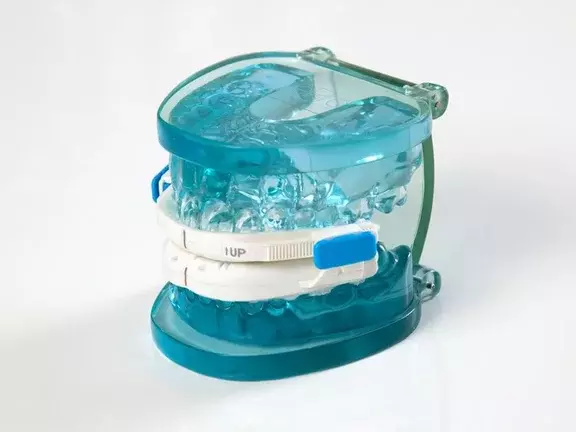Discover Sleep Apnea Treatments
The best treatment options
If you are diagnosed with obstructive sleep apnea (OSA), it will be reassuring to know that it is a common and treatable health condition. There are several treatments that help to reduce and control the symptoms of the disease. In some cases, ongoing, lifelong treatment may be required.
Here are the main ways to treat sleep apnea. Align with your doctor and ask them to suggest the most appropriate treatment for you, considering the severity of your illness and your personal medical context.
Continuous Positive Airway Pressure (CPAP)
It is the standard treatment (1) for Sleep Apnea.
- How does CPAP work?
During sleep, you wear a mask connected to a flow generator that provides a continuous supply of room air and keeps your airways open. Sometimes, a humidifier is used to avoid possible side effects, such as sore throat and nasal dryness (2) . - Why should I use it?
Using CPAP can be uncomfortable initially, and you may be tempted to stop using it. However, if you insist, you will soon get used to it and your quality of life will improve (2) . CPAP reduces snoring and tiredness and also eliminates the risk of cardiovascular diseases (3) .
Before treatment for sleep apnea, your doctor will advise you to make changes to your lifestyle.
To reduce your risk of sleep apnea, you should (2) :
- Lose weight
- Quit smoking
- Sleep on your side instead of on your back
- Reduce the consumption of alcoholic beverages, especially before bed
- Avoid sedative drugs and sleeping pills without prescription and medical advice
References
1. Clinical Guidelines for the Manual Titration of Positive Airway Pressure in Patients with Obstructive Sleep Apnea, Positive Airway Pressure Titration Task Force of the American Academy of Sleep Medicine, Journal of Clinical Sleep Medicine, Vol. 4, No. 2, 2008
2. Obstructive sleep apnea - information prescription / information on prescribing treatments, www.nhs.uk
3. Sleep Apnea and Cardiovascular Disease – AHA/ACCF Scientific Statement. Sommers et al. Circulation 2008; 118:1080-1011
4. Reutrakul S et al. Obstructive Sleep Apnea and Diabetes: A State of the Art Review. Chest. 2017 Nov;152(5):1070-1086
2. Obstructive sleep apnea - information prescription / information on prescribing treatments, www.nhs.uk
3. Sleep Apnea and Cardiovascular Disease – AHA/ACCF Scientific Statement. Sommers et al. Circulation 2008; 118:1080-1011
4. Reutrakul S et al. Obstructive Sleep Apnea and Diabetes: A State of the Art Review. Chest. 2017 Nov;152(5):1070-1086


